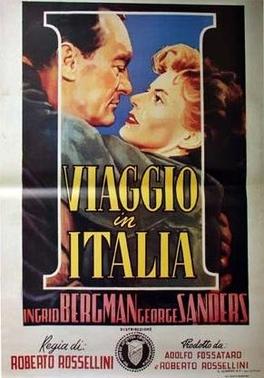
Viaggio in Italia (Voyage to Italy), 1954
Dir: Roberto Rossellini
October 21, 2009
This is a pretty remarkable film for the mid-1950s. Of course, it's a European film, but subtle and inclusive in it's themes. Rossellini's direction captures the Italy all tourists see while blending in his homeland in a way that I'm sure all native Italians would approve of. Despite an ending that I'm not quite sure what to make of (maybe a little too Hollywood, and yet...), I found myself caught up in the lives of this couple on holiday (or business trip) in Italy as their marriage falls apart.
The way that Alex (George Sanders) and Katherine (Ingrid Bergman, Rossellini's wife at the time) treat each other is amazing. Alex has clearly convinced himself that he doesn't love Katherine anymore, and almost goes out of his way put her down. Sanders is amazing as this wealthy British man who back-talks his wife, flirts in front of her with other women, leaves her in Naples to go party with friends in Capri (where he definitely lusts after a married woman), and then as a indecisive soul who almost picks up a lonely prostitute before bubbling over with frustration as he yells at his wife that he wants a divorce. Bergman's Katherine is remarkable in a different way. I almost didn't like her acting at first. It was too stilted, almost like it was being read. The subtlety of her character starts to come out later though, as the time she spends in museums and the ancient ruins of Italy begin to impact her, along with the memory of a sickly young man who read his poetry to her. Half the time she tries to convince herself that she still loves Alex, while the other half she can do nothing but spew venom at him. They make each other jealous; Alex with his flirting, Katherine with her memories ("He was a fool." "He was not a fool! He was a poet." "Aren't they the same?").

Rossellini is also subtle in how he captures everything and creates a mood. From the classic "couples" Hollywood shots and the sweeping pans, the film is grounded in the pop cinema of the times. However, as he captures the people and landscape around the couple, the neo-realist frames almost make it feel like a documentary at points, as does the information that the tour guides give Katherine as she wanders around. The shots of the statues and ruins, along with the accompanying music as Katherine gets caught up in the art and imagery, is a truly remarkable way of representing a life changing moment, the way a great song or painting makes you feel when you first encounter it (It also lets you see where Godard got the idea for Les Mepris (1963)). Italy itself is also a character, with the music, the people, the sounds; everything about the mise-en-scene, especially in the "neo-realist" shots, seems like it could only be captured by an Italian.

So the ending. After the climax where they both decide that they need a divorce, a friend convinces them to go to Pompeii to look at an archeological site, despite their reluctance. There, they see men uncover a couple who died together when Vesuvius erupted, which greatly effects Katherine. They are forced to leave, while Alex thinks it might be best if he heads back to London, not only to give each of them their space but to contact a lawyer about getting divorce proceedings started. Along the way back, they are forced to stop by one of the many religious parades that have happened throughout the film. They get out and watch, and Katherine tries to bridge the gap between them once again, only for Alex to snap back, "You've never understood me and never tried! Let's stop making excuses when we're finally being honest with each other." It seems like the marriage is over, and if the movie had ended there, it would have blown my mind. However, as the parade marches on, a "miracle" happens as a statue passes (Mary, maybe?). A man on crutches is suddenly healed, and the crowd goes bonkers. Katherine gets caught up in the crowd surging towards the statue, and Alex is forced to go after her. When they get back together, they are moved by emotion, and declare their love for one another. Say whaaaat? A miracle, or bullshit? Their is clearly a connotation to the reconciliation and the power of faith, but I was a little let down by this ending. Maybe it's just that the film seemed to be heading for nothing other than the couple's separation, and this just felt like a cop-out. On reflection tough, the sincerely optimistic statement made by the ending is genuinely different in it's own way, not to mention about how faith and Italy are interwoven, though it's just not the one that I would have used. What your personal views about faith may have an impact on how you interpret the ending of the film.

The film succeeds because despite all the wandering and searching the film depicts (which is awesome), it is about a voyage of discovery. It's a leisurely, contemplative film in no hurry to get anywhere (like most vacations) that is a unique testament to faith, even if that means nothing to you. Viaggio in Italia is a film in search of itself, that doesn't know it's own ending until it finally get's to it, miraculously appearing for an audience that could not have possibly seen it coming. Does it feel "right?" I don't know, but I really enjoyed the vacation, as bumpy as it could be at times.

No comments:
Post a Comment